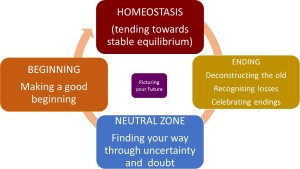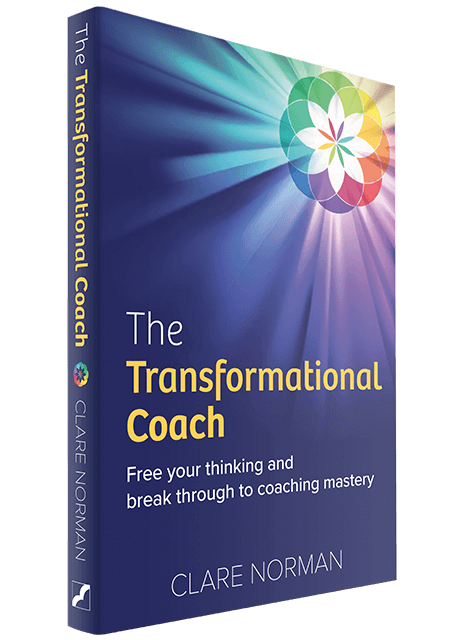So you’ve heard my POV on transitions in my recent podcast The power of transition coaching to facilitate change; and you’ve read about my POV in Managing human transitions for successful change. Now let me share a model for transition coaching that I’ve been working with.
All transition starts with a vision of what the future could be. That might be a self-envisaged change, or it might be a change that our organisation is working towards. Either way, having a clear picture of that future helps us to know where we’re headed.
Often, even when a change is something we want for ourselves, we get caught up in homeostasis, because we like the known, and we fear the unknown. If the change is being “done to us”, we may feel a sense of betrayal, and denial – classic homeostasis tactics that keep us where we are. So there can be work to do to even get us past this hurdle.
Once we’ve decided to make a break for it, we head into de-constructing the old. It helps to name what we are leaving behind (people, possessions, and the less tangibles like security); and also to mark the ending with some form of celebration (like making a speech at your retirement party for example).
Then there’s that no-man’s land, where you are neither here nor there. Oh, how uncomfortable that is, when all you want to do is get started. But there is so much to learn in this phase. Having decided to set up my own company recently, I know how that feels! I am in the midst of organising myself and my systems – figuring out what I want to say about my new business, how I’ll go about getting business, who I need to talk to. It’s all new and although I can take charge of some things, there are other things that just need to take their course. And that requires patience and space.
I’m hoping that I’ll then be able to make a good beginning. So much to think about there.
Oh and it hasn’t all been one-way. I’ve jumped back in the loop a number of times. The feeling of betrayal was hard to shake off, I have to admit. Even when I thought I was over it, I really wasn’t. There were lots of paths to explore too, so even when I thought I had made a decision to take one path, I learned more en route that took me down a different path later. So I’ve been in the neutral zone for a good long time now.
And through all of this, I am getting lots of support and challenge from multiple sources, people who are helping me with both the practicalities AND the psychological transition. I’ve had some remarkable insights about myself in the past few months. Friends, family, coaches, mentors, other independent coaches – you know who you are…thank you all! I’m not there yet, but I’m getting there.
Transition does take time. It cannot be rushed, though it can be helped, with good coaching. Goodness, my transition out of my previous organisation to this point has taken 8 months, and I am still working through it. One of my friends told me she thought that had been pretty quick – it doesn’t feel like it for me, who is in the middle of it all. But I know she is right. Changes that lead to new ways of being really do take a while.
I’d love to hear whether your experience of transition maps to this model; and what you’ve done to help yourself around the circle. Go ahead and share in the comments, for us all the learn from.





Clare, When ever I receive your blog alert, I read it before I start my day 🙂
Thanks for sharing the daring truth, I am pretty much in the same position. I feel exactly the same way as you have called out…I know its so very hard to look at the unknown and be sure to move towards it…as you rightly said purpose or vision is the key driver..
I am in a way getting coached through your blogs, its been a great learning experience…heart felt thanks!
Cheers
Sudha
I’m glad that my experiences and musings are helping you too Sudha. So what are your purpose and vision?